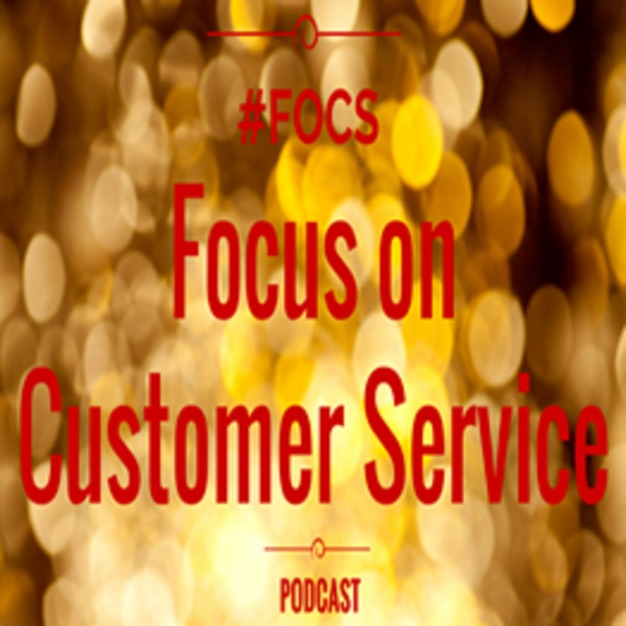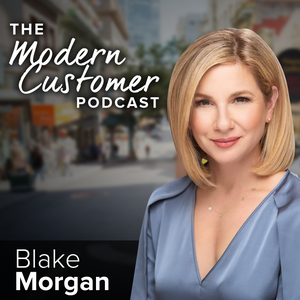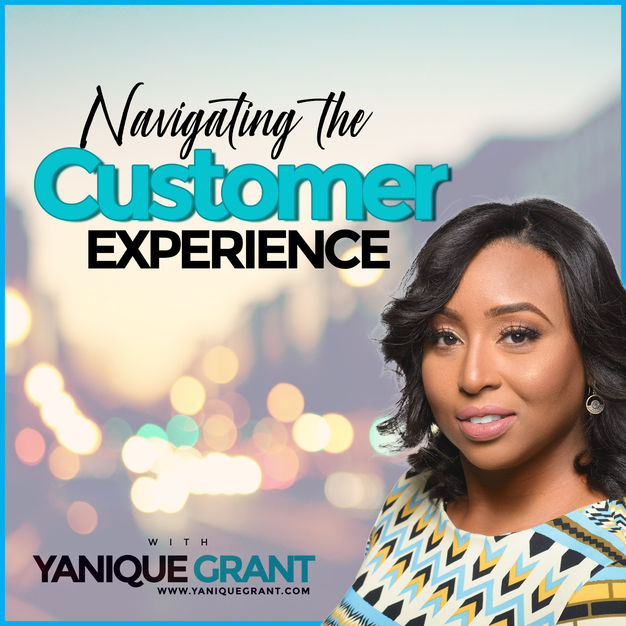
Amazing Business Radio
Amazing Business Radio features customer service expert and New York Times bestselling author Shep Hyken who interviews leading business professionals and other customer experience experts. Each guest shares tips and insights on how to succeed in business.
- 27 minutes 49 secondsExploring the Intersection of Branding and Customer Experience Featuring Joanne Chan
Building a Brand Customers Love
Shep Hyken interviews Joanne Chan, CEO of Turner Duckworth, a world-class branding agency with studios in San Francisco, London, and New York. She talks about how brands like Amazon, Coca-Cola, and Levi Strauss & Co. infuse a clear vision and emotional connection in their branding to communicate a customer-focused experience.
This episode of Amazing Business Radio with Shep Hyken answers the following questions and more:
- How can a company integrate customer service into its branding strategy?
- What role does customer experience play in brand loyalty?
- What are the key elements of a logo or brand identity that influence customer experience?
- Why is it essential for brands to infuse emotion into their visual identity systems?
- How should companies handle feedback to improve their brand's customer experience?
Top Takeaways:
- Branding is crucial for any company because it defines how customers perceive the business. A strong logo and brand identity can create emotional connections with customers, making them more loyal and engaged.
- Successful branding involves creativity and an understanding of what the brand represents. A great logo or brand can stand the test of time while still resonating with new customers, like Amazon's smile logo, which emotionally connects the customer to a happy experience and communicates that Amazon sells everything from A to Z.
- In any business relationship, listening is vital to understanding client needs and expectations. Listening helps you create solutions that cater to the client's specific requirements. Listening with empathy throughout the partnership can nurture long-lasting relationships and repeat business.
- Everyone makes mistakes, and in business, you must handle them well. When a mistake happens, take responsibility, listen to your customers, and work to solve the problem together. Owning and handling mistakes well shows your customers that you are reliable and committed to delivering an amazing experience.
- Creating a brand involves more than just a name or logo. It's about evoking emotions. This involves using design to speak to the heart of what the consumer cares about. That’s part of the customer experience.
- The new generation of customers interacts with brands differently. They expect personalized and engaging experiences. Brands must be flexible and adaptable while maintaining consistency.
- Plus, Joanne shares how her team came up with the Amazon logo and how they purpose-built it for the future. Tune in!
Quote:
"To infuse a brand with personality, marketers need to understand that brands are a way to communicate with their customers. The more emotion you infuse into a visual identity system, the more connection you can have with your customers."
About:
Joanne Chan is the CEO of Turner Duckworth. They managed packaging and brand identity projects for clients like Amazon, Coca-Cola, Levi Strauss & Co., and Samsung.
Shep Hyken is a customer service and experience expert, New York Times bestselling author, award-winning keynote speaker, and host of Amazing Business Radio.
Learn more about your ad choices. Visit megaphone.fm/adchoices
12 November 2024, 11:00 am - 29 minutes 43 secondsThe Evolving Role of AI in Customer Service Featuring Cisco’s Anurag Dhingra
Leveraging Technology to Create Personalized Experiences
Shep Hyken interviews Anurag Dhingra, SVP and General Manager of Cisco Collaboration. He talks about using AI to bridge the gap between consumer expectations and satisfaction by enhancing both customer and employee experiences.
This episode of Amazing Business Radio with Shep Hyken answers the following questions and more:
- How can businesses bridge the gap between customer expectations and satisfaction?
- What role does artificial intelligence play in enhancing customer service interactions?
- What are the benefits of proactive communication in customer service?
- How can AI-driven tools support customer service agents in delivering better service?
- Why is it important for companies to prioritize customer experience over cost optimization?
Top Takeaways:
- There is still a huge gap between what people expect from their customer experience and what they are getting. If you ask a someone if they are happy with their previous customer experiences, the answer will likely be no. Fortunately, we now have the technology to elevate the experiences we can deliver to our customers.
- Technological advancements, especially in AI, present many opportunities for organizations to enhance customer service and experience. AI can help streamline processes, provide real-time insights, and assist agents in answering customer inquiries more effectively.
- Companies need to be thoughtful when implementing AI solutions. While cost optimization is important, it should not overshadow the goal of enhancing customer experience. Businesses should prioritize strategies that directly impact customer satisfaction, such as reducing wait times, creating personalized experiences, and anticipating customer needs.
- Personalization is crucial in creating amazing customer experiences. Customers now expect companies to recognize their preferences and past interactions. Delivering a personalized service can make customers feel valued and understood, strengthening brand loyalty.
- In addition to traditional methods of communications, like phone calls, modern consumers also communicate across various platforms like social media and text messages. Companies need to meet their customers in the channels where they prefer to interact. Offering multiple communication options allows customers to reach out in their preferred way, enhancing engagement and satisfaction.
- Today, the best use case for AI is helping customer support agents, acting as a co-pilot providing real-time assistance and recommendations. AI can enhance agent efficiency by summarizing interactions and handling routine tasks, freeing agents to focus on complex issues. Technology should empower humans, not replace them.
- Plus, Anurag and Shep discuss why it is important to always let customers know when they are talking to AI. Tune in!
Quote:
"Anyone in the organization can be a customer service representative. Because there are now multiple ways to engage with a brand, anyone has the opportunity to do a job that delights the customer."
About:
Anurag Dhingra is the SVP and General Manager of Cisco Collaboration. He leads the technology vision, strategy, and direction for the Cisco Collaboration. He is also on Cisco's Human Rights Advisory Council and the founder of Cisco's Responsible AI initiative.
Shep Hyken is a customer service and experience expert, New York Times bestselling author, award-winning keynote speaker, and host of Amazing Business Radio.
Learn more about your ad choices. Visit megaphone.fm/adchoices
5 November 2024, 10:24 am - 30 minutes 54 secondsRedefining the Contact Center Featuring Jonathan Rosenberg
Exploring AI's Role in Revolutionizing Customer and Employee Experiences in Contact Centers
Shep Hyken interviews Jonathan Rosenberg, Chief Technology Officer and head of AI at Five9. He talks about how contact centers can use generative AI to deliver customer experiences that people love.
This episode of Amazing Business Radio with Shep Hyken answers the following questions and more:
- How can companies effectively balance customer self-service with personal interactions in high-stakes situations?
- How does AI contribute to transforming contact center agents into brand ambassadors?
- Why is empathy important in customer service interactions, and how can AI complement this human trait?
- How does the implementation of AI tools impact companies' return on investment?
- How does generative AI reduce labor costs in contact centers while maintaining human involvement?
Top Takeaways:
- AI is changing the way that contact centers operate. AI-driven tools can handle simple queries and support human employees in answering complex questions. It allows businesses to offer quick, precise help that reduces call and hold times while keeping human agents available for tasks requiring empathy and complex problem-solving.
- Self-service options are growing more advanced and popular. Although AI can tackle straightforward and repetitive tasks, humans are necessary for high-stakes or complicated situations due to their ability to understand emotions and contexts more deeply.
- AI isn't about replacing human employees but empowering them. It provides agents with insights and recommendations in real time so they can focus on building stronger relationships with customers. With AI tools, agents can support customers more effectively, easily handle complex queries, and even seize upsell opportunities.
- Great customer experiences can lead to loyal customers. With AI tools, employees can easily access customer's history of interactions with the brand and get information from a broad knowledge base that can help them offer personalized solutions. When customers feel understood and valued, they are more likely to return and tell others about their positive experiences.
- AI is quicker and more cost-effective to implement than ever, and the return on investment from AI in customer service is significant. AI can shorten call handling times and make each interaction more efficient, saving money for the business.
- Plus, Shep and Jonathan discuss what happens to companies that are laggards when it comes to adopting AI. Tune in!
Quote:
"Setting up and implementing AI has historically been expensive and prohibitive for businesses. Now, with generative AI, it is quick and easy to get started, and the cost of maintaining it is low."
About:
Jonathan Rosenberg is the Chief Technology Officer and head of AI at Five9. He is responsible for the engineering and operational teams building Five9's Genius AI portfolio.
Shep Hyken is a customer service and experience expert, New York Times bestselling author, award-winning keynote speaker, and host of Amazing Business Radio.
Learn more about your ad choices. Visit megaphone.fm/adchoices
29 October 2024, 10:00 am - 24 minutes 40 secondsThe Secret to eBay's Phenomenal Customer Experience Featuring Derek Allgood
Transforming Customer Support with Technology and Empathy
Shep Hyken interviews Derek Allgood, VP of Global Customer Experience (GCX) at eBay. He discusses the importance of nurturing a supportive culture and harnessing innovative tools like AI to enhance employee and customer service.
This episode of Amazing Business Radio with Shep Hyken answers the following questions and more:
- How does enhancing the employee experience contribute to a better customer service experience?
- How can businesses balance automated customer service solutions with human interactions?
- What strategies can support remote customer service employees in delivering consistent experiences?
- How do self-service solutions impact the overall efficiency of customer service operations?
- How essential is a strong company purpose in driving customer satisfaction?
Top Takeaways:
- Listening is critical to building strong relationships in business and life. When interacting with customers or clients, it is essential to fully comprehend their needs and concerns before taking action. Active listening involves paying attention, asking clarifying questions, and genuinely showing empathy.
- High employee turnover leads to increased costs and decreased customer satisfaction. Focus on creating a fulfilling and supportive work environment for your team members. Employees who feel valued and engaged become more committed to their roles and deliver exceptional service.
- Today, more people are working remotely, which requires new ways of maintaining communication and culture. Effectively using technology to communicate improves work efficiency and connectivity. Communication technology helps ensure that employees remain connected and well-informed and can support one another in real time.
- Self-service technology helps streamline interactions and solve issues quickly. By implementing self-service options, businesses can empower customers to find the answers they need without waiting to speak with a representative. This reduces wait times and allows customer support teams to focus on more complex issues. It also leads to cost savings for businesses and a more satisfying experience for both customers and employees.
- A great business also thinks about how it can contribute positively to the world. This involves supporting causes that align with the company's values and making a meaningful impact on communities. By having a purpose beyond making money, businesses can connect with people on a more personal level. This builds trust and loyalty among consumers and employees alike.
- Plus, Derek talks about eBay's innovative AI solutions to support employees and customers. Tune in!
Quotes:
"The first thing that we have to do in any relationship is to listen. As a business with a buyer and seller relationship, listen and try to understand where the customers are in their journey, what's gone wrong, and how you can support the employees helping them."
About:
Derek Allgood is the VP of Global Customer Experience (GCX) at eBay. He has over 20 years of experience leading customer support teams for global companies such as Citiphone, Global Consumer Bank, and Barclays.
Shep Hyken is a customer service and experience expert, New York Times bestselling author, award-winning keynote speaker, and host of Amazing Business Radio.
Learn more about your ad choices. Visit megaphone.fm/adchoices
22 October 2024, 12:00 pm - 26 minutes 33 secondsHow OKRs (Objectives and Key Results) Transform Customer-Centric Strategies Featuring Jeff Gothelf
Aligning Business Goals with Customer Needs
Shep Hyken interviews Jeff Gothelf, author of Who Does What By How Much?: A Practical Guide to Customer-Centric OKRs. He talks about how aligning objectives and key results with customer needs can transform business success.
This episode of Amazing Business Radio with Shep Hyken answers the following questions and more:
- What is an OKR?
- How do customer-centric OKRs help teams focus on the right tasks?
- Why is it important for businesses to align their objectives with customer-centric goals?
- How does measuring customer behavior contribute to better customer satisfaction?
- How can understanding customer patterns help prevent client defection?
Top Takeaways:
- OKR is an acronym meaning Objectives and Key Results. They are a strategic framework for setting clear goals and measuring outcomes. By having clear goals and knowing what results are expected, everyone in the organization moves in the right direction. When these OKRs are focused on the customer, they help companies make decisions that make their customers happy and loyal to the brand.
- Objectives are qualitative goals describing the end state you want your customers to experience. For example, you want to offer the best product or be the easiest to do business with. The key results are the quantitative measures of human behavior that tell us we've achieved that state. It answers: What will your customers do differently, and by how much?
- Customer satisfaction is important, but understanding customer behaviors is crucial. Often, dissatisfied customers stop using the product. They show up less often. They spend less money. They stop telling their friends about it. If you can understand these patterns of your customer's behavior, you can proactively take action before it becomes a problem.
- Determine which behaviors (trying out products, asking more questions, etc.) will deliver the results that your company is looking for. Then, create an environment, a system, a service, or a store that positively amplifies those behaviors for the customer.
- Providing your team with the objectives and allowing them to figure out the best way to achieve them communicates that you trust your employees to use their skills to meet customer needs.
- Not all strategies will work from the start. Organizations need to develop a culture of learning. It allows teams to learn from mistakes and objectively measure the success of an idea. Then, businesses can make informed adjustments and improve with each attempt.
- Plus, Jeff explains why some employees end up working on the wrong tasks and how organizations can avoid that. Tune in!
Quote:
"Customer centricity puts the customer at the center of all our decisions. Every time we make a decision, the critical question is—What impact do we think this will have on the customer? And, is that something that we want to do?"
About:
Jeff Gothelf is a business strategy and customer-centricity expert, speaker, and author. He is the co-author of Lean UX, Sense & Respond, and Who Does What By How Much?: A Practical Guide to Customer-Centric OKRs.
Shep Hyken is a customer service and experience expert, New York Times bestselling author, award-winning keynote speaker, and host of Amazing Business Radio.
Learn more about your ad choices. Visit megaphone.fm/adchoices
15 October 2024, 12:00 pm - 27 minutes 47 secondsPersonalization in the Age of Artificial Intelligence Featuring Mark Abraham
How Personalized Customer Experiences Can Drive Business Growth
Shep Hyken interviews Mark Abraham, Senior Partner at Boston Consulting Group and author of Personalized: Customer Strategy in the Age of AI. He talks about AI's potential to enhance personalization and the impact of tailored customer experiences on business growth.
This episode of Amazing Business Radio with Shep Hyken answers the following questions and more:
- What is true personalization?
- How can AI enhance personalization?
- How does personalization contribute to customer loyalty and satisfaction?
- How can businesses balance personalization with customer data privacy concerns?
- What are some common misconceptions about personalization in customer service?
Top Takeaways:
- Personalization means using what you've learned about the customer from their past interactions to improve their future experiences.
- True personalization is not just about using a customer's name or offering customized products. True personalization involves using customer data at scale to make their next experience smoother, faster, and more convenient.
- There are some concerns among customers about data privacy and personalization. Businesses must first get the opt-in from their customers. Second, it is important to ensure personalized experiences are contextually appropriate to the customer's journey.
- Respecting customer privacy can make or break a personalized experience. Businesses should collect first-party data (data from transactions) and zero-party data (data directly shared by customers) to create a more accurate and respectful personalization strategy.
- Artificial Intelligence has the potential to significantly enhance personalization. It can analyze vast amounts of data to predict and suggest the next best actions for customers, recommend products or services, and tailor customer service interactions.
- Starting with personalization doesn't have to be complicated. Start by identifying one area where personalization can have the most impact and using available tools and technologies to implement it.
- Mark also shares The Five Promises of Personalization, a practical way to think about how you deliver great personalization.
- Empower me: Start with the customer. How are you helping them solve problems or fulfill a need?
- Know me: To help a customer, you need to know them. Find ways to engage the customer and collect relevant data in between.
- Reach me: Use AI to know how to reach out to your customers and what messages are most appropriate and relevant to send them.
- Show me: Build a content library and use content management systems and automation to deliver personalized content at scale.
- Delight me: Make the personalized experience seem more magical.
- Plus, Mark answers the question—Is true personalization an expensive thing to do? Tune in!
Quote:
"Personalization isn't just customization. Personalization is taking what you've learned about a customer in an interaction and making their next interaction better, faster, or more convenient."
About:
Mark Abraham is a Senior Partner at Boston Consulting Group and the founder of the company's Global Personalization business. He co-authored Personalized: Customer Strategy in the Age of AI with David C. Edelman.
Shep Hyken is a customer service and experience expert, New York Times bestselling author, award-winning keynote speaker, and host of Amazing Business Radio.
Learn more about your ad choices. Visit megaphone.fm/adchoices
8 October 2024, 10:00 am - 26 minutes 1 secondHow Artificial Intelligence Can Supercharge Employee and Customer Experiences Featuring Jim Payne
AI's Growing Impact on Employee and Customer Experience
Shep Hyken interviews Jim Payne, Director of Product Marketing, Customer Engagement at RingCentral. He talks about how AI is transforming both customer and employee interactions by enhancing productivity and efficiency.
This episode of Amazing Business Radio with Shep Hyken answers the following questions and more:
- How is AI transforming both employee and customer experiences?
- Can AI be utilized effectively in smaller companies with limited budgets?
- How does AI improve efficiency and productivity for customer service teams?
- What is the impact of AI on employee retention?
- What are the challenges related to integrating AI into existing customer service systems?
Top Takeaways:
- Artificial Intelligence is significantly impacting both customer and employee experiences. The latest research by RingCentral and Metrigy has uncovered that over 80% of companies are using or planning to use AI to enhance customer and employee interactions this year.
- The cost of using AI for business has dramatically decreased. In the past, deploying AI would mean a considerable investment needing data scientists and experts to implement. Today, it has become more accessible to even small and medium-sized businesses. The benefits of AI, such as increased productivity and efficiency, are no longer exclusive to large organizations.
- AI will not replace human employees. Instead, it will augment their capabilities, make their jobs easier, and empower them to serve more customers.
- By automating repetitive, mundane tasks, AI allows employees to focus on more meaningful work. In customer support, AI can manage routine inquiries and free agents to tackle more complex issues that need human-to-human interaction. This boosts productivity and reduces stress and burnout, leading to a happier workforce.
- Inconsistent experiences with digital tools may cause customers to hesitate to choose self-service options. Companies must ensure their AI systems are reliable and user-friendly to encourage more customers to embrace them.
- AI creates seamless experiences for both customers and employees. Whether a customer is talking to a chatbot or a human agent, all relevant information can be retained and accessible. This prevents customers from having to repeat themselves. It also empowers employees with the information they need to resolve issues quickly.
- By integrating AI solutions, businesses can enhance their existing workforce. AI helps shorten the time an agent needs to solve problems. In their recent study, RingCentral and Metrigy found that AI helps reduce the time to complete a call by 39% on average. This allows contact centers to handle higher volumes of inquiries with fewer agents, bridging staffing gaps and improving the overall service quality.
- Plus, Shep and Jim share innovative ways AI is being used to support customer service agents. Tune in!
Quote:
"AI supercharges people. It doesn't replace human-to-human interaction. It just makes everything better, faster, and easier."
About:
Jim Payne is the Director of Product Marketing, Customer Engagement at RingCentral. He specializes in Artificial Intelligence and Machine Learning and how they can be applied to improve customer experiences.
Shep Hyken is a customer service and experience expert, New York Times bestselling author, award-winning keynote speaker, and host of Amazing Business Radio.
Learn more about your ad choices. Visit megaphone.fm/adchoices
1 October 2024, 11:11 am - 26 minutes 7 secondsHow to Build a Culture That Employees and Clients Love Featuring Terry Turner
The Impact of the Employee Experience on the Client Experience
Shep Hyken interviews Terry Turner, president and CEO of Pinnacle Financial Partners. He talks about how investing in employee experience can create loyal customers, strong relationships, and higher shareholder returns.
This episode of Amazing Business Radio with Shep Hyken answers the following questions and more:
- How does a positive employee experience translate to a better customer experience?
- What are effective strategies for reducing employee turnover?
- How can businesses balance high-tech solutions with high-touch customer service?
- How does stability in the workforce enhance overall customer satisfaction?
- How does employee empowerment impact the quality of customer service?
Top Takeaways:
- The way a company treats its employees impacts how they treat customers. What is happening inside the organization is felt outside by the customers. Happy and motivated employees are more likely to go above and beyond to meet client needs.
- Using the word "clients" instead of "customers" can convey a deeper, more lasting relationship. While "customers" might imply a transactional relationship, "clients" suggests a collaborative partnership. This shift in terminology can change how employees perceive and interact with the customers they serve.
- Empowering employees can help reduce bureaucracy. Less bureaucracy means faster decision-making and the ability to respond more quickly to customer needs. Building a reputation for being efficient and easy to do business with can set you apart from the competition, no matter the industry.
- Personalized interactions can create advocates and promoters out of your customers. Knowing your clients well helps provide better advice and services tailored to their needs. It can be as simple as knowing clients' names and remembering previous interactions.
- Trust can transform your customer relationships from a vendor-customer connection to a partnership. Clients need to know they can rely on you for solid, honest advice and consistent service.
- The balance of high-tech and high-touch can significantly enhance the customer experience. It is not always about the newest technology. It is about how your technology matches your business process, employee mindset, and customer needs.
- Plus, Terry shares how Pinnacle Financial Partners continues to grow without having to advertise. Tune in!
Quote:
"The number one inhibitor of great service is turnover. If you can't stabilize your workforce, there's no chance you'll give great service."
About:
Terry Turner has been the president and CEO of Pinnacle Financial Partners since it was founded in 2000. He is an active member of his community, serving on the boards of the Nashville Sports Council, Salvation Army, Belmont University, Nashville Chamber of Commerce, and the Nashville branch of the Federal Reserve Bank of Atlanta.
Shep Hyken is a customer service and experience expert, New York Times bestselling author, award-winning keynote speaker, and host of Amazing Business Radio.
Learn more about your ad choices. Visit megaphone.fm/adchoices
24 September 2024, 10:30 am - 26 minutes 14 secondsHow Artificial Intelligence is Changing Customer Expectations Featuring Laura Burgess
Effectively Integrating AI into Customer Service
Shep Hyken interviews Laura Burgess, senior research analyst at Capterra (a division of Gartner), a trusted software and services marketplace that offers a wide range of solutions to help organizations meet many of their business needs. She talks about how AI is transforming customer service and how organizations can balance digital interactions with the human touch to enhance customer satisfaction.
This episode of Amazing Business Radio with Shep Hyken answers the following questions and more:
- Why are customer expectations rising in today's market?
- How can AI enhance customer service experience?
- How can businesses effectively implement AI in customer service?
- Why is transparency when using AI in customer interaction?
- How can businesses balance between AI and human support?
Top Takeaways:
- Over the last two years, customer satisfaction (CSAT) scores have increased. A study by Capterra found that 63% of U.S. businesses have shown a marked improvement in customer satisfaction.
- Customer expectations have risen due to the availability of multiple communication channels like the phone, email, chat, and social media. Today, customers expect quick, efficient, and instant responses. Technology plays a significant role in meeting these expectations by providing faster service across multiple channels.
- Transparency is key when it comes to customer interaction. Letting customers know that they are interacting with AI through notifications before the engagement and during interactions can build trust, comfort, and acceptance.
- To optimize customer service, companies should leverage the strengths of both AI and human support. While human support is crucial to personalized interactions, AI excels in faster response times, handling repetitive tasks, providing 24/7 availability, and offering multilingual support.
- AI will not eliminate jobs. It will disrupt job roles. Employees believe that, in the next five years, 52% of customer queries will be handled exclusively by AI. Customer service roles will evolve, with humans focusing more on strategic, empathetic, and more complex tasks.
- Integrating AI into customer service isn't just about getting the latest technology. It requires training employees to use AI tools and understand AI insights effectively. This training also benefits employees by boosting their technical skills, making them more versatile and valuable to the organizations they work for.
- As businesses continue to invest in AI, it's essential to continuously measure its impact on customer experience. Companies should focus on fine-tuning these technologies to deliver accurate and helpful responses while maintaining the availability of human agents for more sensitive or complex issues.
- Plus, Shep and Laura discuss more stats from Capterra's 2024 Customer Service Technology Survey and how it shapes the future of customer service. Tune in!
Quote:
"Consumers are more demanding than ever when it comes to their interactions with companies, thanks to multi-channels of communication which enable faster services and instant responses."
About:
Laura Burgess is a senior research analyst at Capterra with specialized knowledge of sales and customer experience (CX). Capterra offers businesses over 90,000 solutions across 1,300 software types and 50,000+ service providers to choose from.
Shep Hyken is a customer service and experience expert, New York Times bestselling author, award-winning keynote speaker, and host of Amazing Business Radio.
Learn more about your ad choices. Visit megaphone.fm/adchoices
17 September 2024, 10:45 am - 27 minutes 43 secondsTransforming Customer Service from a Cost Center to a Profit Center Featuring Brett Frazer
Implementing The 5 A's of Successful Customer Engagement
Shep Hyken interviews Brett Frazer, co-founder of Service Matters, LLC and the author of Your Hidden Profit Center: Mastering the Five A's of Successful Customer Engagement. He talks about shifting customer service from a cost center to a value center and outlines the 5 A's framework for adding value to every customer engagement.
This episode of Amazing Business Radio with Shep Hyken answers the following questions and more:
- How has the perception of customer service evolved from being seen as a cost center to being recognized as a profit center?
- What are the potential long-term effects of prioritizing cost reduction in customer service?
- Why should companies focus on aligning with customers on the desired outcome rather than just providing a direct solution?
- Why is it crucial for customer service initiatives to gain buy-in and support from key organizational stakeholders and leadership?
- How can organizations best empower customer support agents?
Top Takeaways:
- Customer service has evolved from being a cost center to a hidden profit center. Focusing on reducing investment in good customer experiences has a long-term negative impact on customer loyalty and profitability.
- Brett shares The 5 A's of Successful Customer Engagement.
- Acknowledge - Acknowledgment is about empathy and addressing the customer's emotional needs. Acknowledge the customer as a person, their relationship to the company, and the problem and solution they seek.
- Align - Listen, troubleshoot, and collaborate with the customer to reach the outcome that they are trying to achieve.
- Assist - Provide the most appropriate options for the customer that are personalized to the situation that they are in.
- Advise - Enable and empower your agents with knowledge and data about the customer so they can provide insights that add value.
- Ask - Ask for revenue, actions, and information, and create awareness to increase the customer's lifetime value.
- If you can't get leadership and key stakeholders behind the transformation of your organization's customer service and experience, it's not going to work.
- The focus should not only be on providing immediate assistance but also on building long-term relationships with customers. Customer service is an opportunity to add value that creates customer loyalty and can significantly impact the organization's bottom line.
- A great customer relationship hinges on understanding the customer's needs, empathizing with their situation, providing tailored solutions, and proactively seeking opportunities to add value to the customer experience.
- Plus, Brett shares more tips and strategies from his book, Your Hidden Profit Center: Mastering the Five A's of Successful Customer Engagement, to help your organization save time and increase profits. Tune in!
Quote:
"Over the years, customer service has been considered a cost center. The focus was on how we could make customer service as cheap and as quick as possible. This mindset takes away from the intent of customer service and support, which is to provide a great experience to keep your customers coming back."
About:
Brett Frazer is a thought leader and expert in customer service and contact centers. He is the co-founder of Service Matters, LLC, and the author of Your Hidden Profit Center: Mastering the Five A's of Successful Customer Engagement.
Shep Hyken is a customer service and experience expert, New York Times bestselling author, award-winning keynote speaker, and host of Amazing Business Radio.
Learn more about your ad choices. Visit megaphone.fm/adchoices
10 September 2024, 10:00 am - 26 minutes 44 secondsHow Aligned Teams Can Supercharge Your Customer Experience Featuring Alan Williams
Using the Hospitality Mentality to Shape Your Company Culture
Shep Hyken interviews Alan Williams, Founder and managing director at SERVICEBRAND GLOBAL Ltd and the co-author of Supercharging the Customer Experience: How Organizations Can Drive Performance in Today's Values-Based Economy. He talks about aligning the organization's culture, from the leadership to the frontlines, with its customer experience.
This episode of Amazing Business Radio with Shep Hyken answers the following questions and more:
- Why is alignment within an organization important for the customer experience?
- How has the customer landscape changed in the last 20 years?
- Why does customer experience start with leadership?
- How is employee engagement linked to the customer experience?
- Why is brand identity crucial for an organization's customer experience?
Top Takeaways:
- Customer experience is not just a function or a set of processes. It's not just some department or strategy. It is ingrained into the company's culture from the top leadership to every employee. It's in the DNA.
- Everybody's job is important when it comes to customer experience. Every employee must understand how what they do impacts the customer, even if they're two or three places removed.
- Over the last 20 years, customer decision has shifted to where it is 80% driven by emotion and values. Customers choose to do business with companies that share the same values and stand for the same social causes as them.
- Communication has greatly evolved thanks to the internet and social media. Customers' thoughts about a brand can now be shared with millions of people in an instant. Companies need to ensure that their messaging is authentic to their brand identity and resonates with their audience.
- Organizations used to have the majority of control over brand perception. They could decide how they want to be perceived and hire a company to pump out that message. Now, customers put more trust in what their friends, family, or colleagues tell them.
- The customer focus should extend to the organization's internal customers as well. Every role, whether customer-facing or support-oriented, plays a part in shaping the overall customer experience. Customers, employees, service partners, and communities now shape how people think about a brand.
- Customer experience should reflect the organizational brand identity. Every aspect of the customer journey, from arrival to departure, should embody the organization's values. Every action, whether customer-facing or behind the scenes, should reflect the company's mission. When everyone in the organization understands and represents the brand identity, it creates a consistent and compelling customer experience.
- Plus, Alan shares examples of customer experience from the hospitality industry (every type of business can benefit from a hospitality mentality.) Tune in!
Quote:
"A hospitality mentality helps drive customer experience. It is a brilliant training ground because you can learn a lot from that space and then apply it to other sectors."
About:
Alan Williams is the founder and managing director of SERVICEBRAND GLOBAL Ltd and the co-author of Supercharging the Customer Experience: How Organizations Can Drive Performance in Today's Values-Based Economy.
Shep Hyken is a customer service and experience expert, New York Times bestselling author, award-winning keynote speaker, and host of Amazing Business Radio.
Learn more about your ad choices. Visit megaphone.fm/adchoices
3 September 2024, 10:00 am - More Episodes? Get the App
Your feedback is valuable to us. Should you encounter any bugs, glitches, lack of functionality or other problems, please email us on [email protected] or join Moon.FM Telegram Group where you can talk directly to the dev team who are happy to answer any queries.
 Customer Engagement Radio
Customer Engagement Radio
 Focus on Customer Service Podcast
Focus on Customer Service Podcast
 The Modern Customer Podcast
The Modern Customer Podcast
 Project Distinct Podcast
Project Distinct Podcast
 Navigating the Customer Experience
Navigating the Customer Experience
 Experience This!
Experience This!